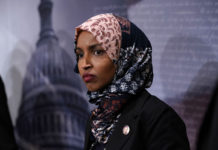The White House on Sunday vowed to help provide “rigorous firearms training” to some schoolteachers and formally endorsed a bill to tighten the federal background checks system, but it backed off President Trump’s earlier call to raise the minimum age to purchase some guns to 21 years old from 18 years old.
Responding directly to last month’s gun massacre at a Florida high school, the administration rolled out several policy proposals that focus largely on mental health and school safety initiatives. The idea of arming some teachers has been controversial and has drawn sharp opposition from the National Education Association, the country’s largest teachers lobby, among other groups. Many of the student survivors have urged Washington to toughen restrictions on gun purchases, but such measures are fiercely opposed by the National Rifle Association, and the Trump plan does not include substantial changes to gun laws.
Rather, the president is establishing a Federal Commission on School Safety, to be chaired by Education Secretary Betsy DeVos, that will explore possible solutions, such as the age requirement for purchases, officials said.
DeVos characterized the administration’s efforts as “a pragmatic plan to dramatically increase school safety.”
“We are committed to working quickly because there’s no time to waste,” she said on a conference call with reporters on Sunday evening. Invoking past mass school shootings, she continued, “No student, no family, no teacher and no school should have to live the horror of Parkland or Sandy Hook or Columbine again.”
The administration’s proposals come after 17 people were shot and killed last month at Marjory Stoneman Douglas High School in Parkland, Fla., a massacre that spurred officials in Washington to reevaluate gun laws.
Democratic lawmakers and gun-control advocates accused Trump of succumbing to pressure from the NRA and other special-
interest groups.
“The White House has taken tiny baby steps designed not to upset the NRA, when the gun violence epidemic in this country demands that giant steps be taken,” Senate Minority Leader Charles E. Schumer (D-N.Y.) said in a statement. “Democrats in the Senate will push to go further including passing universal background checks, actual federal legislation on protection orders, and a debate on banning assault weapons.”
Kris Brown, co-president of the Brady Campaign to Prevent Gun Violence, said in a statement that “President Trump has offered only drips of water in response to a five-alarm fire.”
Trump has said he was personally moved by the shooting — and by the persistent and impassioned calls for action from some of the teenage survivors as well as parents of the victims — and elevated the issue of school safety in his administration. He has called for raising the minimum age for purchasing an AR-15 or similar-style rifles from 18 to 21 years old.
“Now, this is not a popular thing to say, in terms of the NRA. But I’m saying it anyway,” Trump said in a Feb. 28 meeting with lawmakers. “You can buy a handgun — you can’t buy one; you have to wait until you’re 21. But you can buy the kind of weapon used in the school shooting at 18. I think it’s something you have to think about.”
But the White House plan released Sunday does not address the minimum age for gun purchases. Pressed by reporters about the apparent backtracking, a senior administration official said the age issue was “a state-based discussion right now” and would be explored by DeVos’s commission.
At a political rally Saturday night in Pennsylvania, Trump mocked the idea of commissions to solve the nation’s drug epidemic. “Do you think the drug dealers who kill thousands of people during their lifetime, do you think they care who’s on a blue-ribbon committee?” Trump said. “The only…









